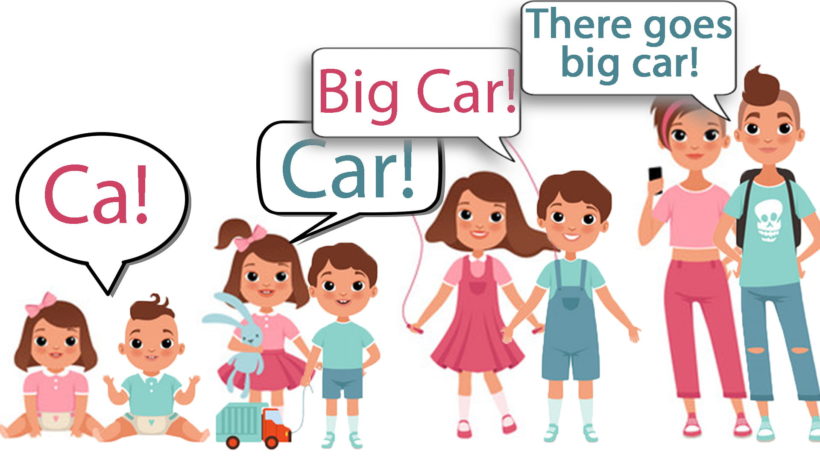Speech. The ultimate way of communication. We can’t wait for the time when our toddler will start using words instead of, often frustrating, nonverbal attempts at communication. But there is a lot we can do, from the earliest age to encourage speech development and language skills. So let’s talk about things we can do to speed up the speech development in toddlers and children.
Article Contents
1. What speech milestones and language skills can we expect at different ages of life?2. How to encourage speech development through different age of children
2.1. Birth to 6 months old Baby
2.2. 6 months to 12 months old Baby
2.3. 13 months to 18 months old Toddler
2.4. 18 months to 2 years old Toddler
2.5. 2 years to 3 years old Toddler
3. General strategies to encourage talking and language development
4. Speech development problems and language delay problems that can cause late-talking in children
We parents like to look at the growth of our little ones through the set of milestones. First, we wait when the newborn will be able to turn on the belly, then sit, crawl, walk… And then comes the time around a year and a half when we wait for that, probably one of the most important milestones – talking!
Parents are impatient and can’t wait until their toddler starts to speak. But as with any milestones, they are not set in stone and can vary between the children. That doesn’t mean we should ignore this important skill, because there is a lot we can do to help our child to master the concept of speech.
Also, we shouldn’t wait toddlerhood to start. There are many activities and games we can use, almost from the day of the birth (some say even sooner), to speed up and prepare our child for this important skill – using words and communicating with speech.
So let’s take a look at some things we can do to boost the speech development of our child.
What speech milestones and language skills can we expect at different ages of life?
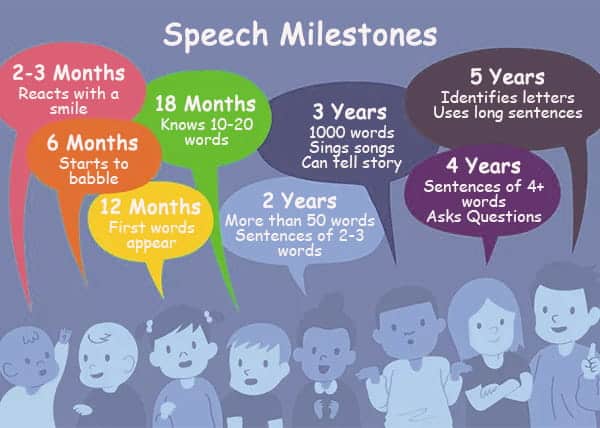
| CHILD AGE | EXPECTED LANGUAGE AND COMMUNICATION MILESTONES |
|---|---|
| Birth | Baby cries right from day 1. |
| 2-3 months old | The baby reacts to you with any sound and also reacts with a smile. |
| 6 months old | Babbling starts to emerge. Also, babies turn their heads toward new sounds. |
| 8 months old | The baby responds to its name when we call it. |
| 10 months old | Repeats one syllable over and over. Shouts when it wants to attract attention. |
| 12 months old | The baby is able to say 1 or 2 words. Words still don’t need to have meaning. The baby also starts to imitate sounds it hears and points to objects it finds interesting. |
| 12-17 months old | The toddler starts to use words like “mama” or “dada”, and other simple words. Imitates familiar sounds, understands “no” and simple instructions. |
| 18 months old | Vocabulary increases and the toddler is able to use from 10 to 20 words. Toddler will start to communicate with words what it wants like “give” or “more”. The toddler is able to use simple sentences made from 2 words like “go there” or “give drink”. Also, the toddler recognizes body parts when we name them. |
| 2 years old | Vocabulary increases even further and the toddler knows more than 50 words. It is also able to say sentences of 3 words. Words in sentences are used in the correct order. The toddler is able to name body parts, it names pictures in the book when we ask and it starts to use some plurals while talking. |
| 2 and a half years old | The toddler has more than 400 words in the vocabulary. It starts to use pronouns like “I”, “you”, “we” “they”. Combines nouns and verbs and uses some plurals. Uses 3-word sentences or more and it likes repetition, like hearing the favorite story over and over. Strangers will understand most of the words that a toddler speaks. |
| 3 years old | Vocabulary is around 1000 words, the child knows its last name and street name. It can tell a story, knows a couple of nursery rhymes, and can sing songs. |
| 4 years old | Children can use sentences of 4 or more words. The child asks a lot of questions, like “Why?”, “Where?”, “Who?”. It can use the past tense, identify colors and shapes. |
How to encourage speech development through different age of children
Birth to 6 months old Baby
Eye contact and holding the baby when talking to them
In this age, babies are particularly interested in faces as they observe you when you talk. They start to notice your paralinguistic speech and body language. And don’t hesitate to talk to your newborn. Even newborns benefit from hearing the speech, particularly the mother’s voice. You should speak slowly so the child has time to process the sounds it hears.
Narrate the things you are doing
For example, when you’re feeding a baby, changing a diaper, putting clothes on the baby, talk about what you are doing and what comes next. This is an important thing to do through all ages, and it will help you practice talking like that the sooner you start. Also, it helps babies in connecting actions with words. Another benefit is that the child will be prepared for what is coming and this will prevent a lot of frustration in the future.
Use simple sounds
Sounds like “ma”, “da”, “ba”, “oh”. These simple sounds and consonants have a great effect on the newborns. They are simple enough that babies can perceive them and as they grow they will try to imitate those sounds and that is the first step in speech development.
Singing songs and rhymes and talking with a singing voice
Songs and rhymes shift focus to language a lot more than talking. This will help in drawing a baby’s attention and help them to tune in the rhythm and flow of language.
Repeating the sounds the baby makes back to them
This is helpful in teaching the child to listen and that conversation is about taking turns between people participating in a conversation.
6 months to 12 months old Baby
Draw attention and name things from the surroundings
This one is really important but often overlooked. It can be a great activity when you are casually strolling outside. Point at things in your surroundings and name them. Like: “Look, there is a car”, “There is a dog” etc. This helps the baby to learn the names of objects and living beings around them. It helps them to learn words and soon they will start to imitate you. As they grow and learn words, expand with more details. “Look, a big truck.” “There goes a green car.”
Start using books with a baby
It’s never too early to start using books, especially since they are a powerful tool in developing speech. You don’t need to read the books at this age, you can just go through the pages with the baby and talk about the pictures you see.

Try to get rid of a pacifier or use it only at night
Dummy or pacifier can negatively affect the development of talking in babies and children. Because you can’t talk while something is in your mouth, right?
Play games with your baby
Games like “peek-a-boo” or similar games for babies are excellent for learning important skills like listening, paying attention, and taking turns in games with more players.
13 months to 18 months old Toddler
Repeat words proper way, don’t correct or criticize
If the toddler says a word that contains errors, like “Hos!” for a House, just agree and repeat the word properly. You can say: “Yes, that is a house!” Saying things like “No, we don’t say it like that…” or “We say H O U S E, now you say it again!” won’t help. It can just develop an aversion for talking in a child.
Use choices to increase vocabulary
Choices are great for fulfilling the toddler’s need for control and for developing vocabulary. Offer them 2 choices. Like “Do you want to wear a red shirt or green shirt?”. Two choices is enough at this age to not overwhelm the child.
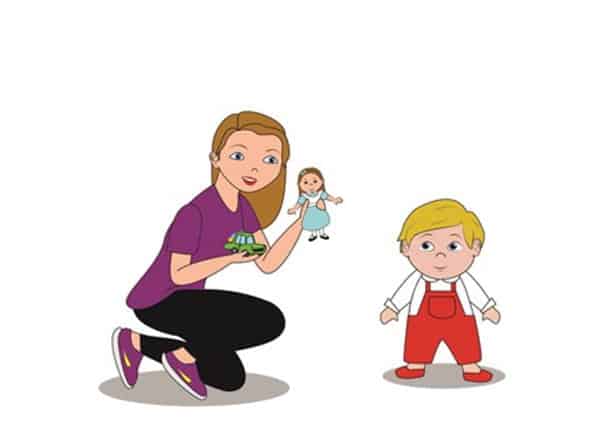
Listen and sing songs and nursery rhymes together with a toddler
Rhymes are excellent for improving language skills since they are easier to memorize. You should lead by example and sing to your toddler. Soon, he or she will join you in singing and even sing alone when in the mood. Listening to songs is great for learning new words, improving memory, listening skills, and teaches how to express ideas with words.
18 months to 2 years old Toddler
Repetition of words
Repeating is the mother of learning, they say. That is also true for Toddlers. Repeating the same word many times will help them to learn and remember the word quickly. Repetition happens naturally if you use the tactic of describing what you are doing.
And you can even spice it a bit more. “Let’s put your pants on”. “How do you like these pants?” “I think you look great in your green pants!” are some examples of how you can communicate with a toddler to enhance the learning of a word.
Use instructions that are simple and short
At this age, toddlers are able to follow simple instructions. “Take your cup”, “Blow the nose”, “Get your hat” are examples of simple instructions that Toddlers will understand. And giving instructions will help in language development by connecting actions with words.
Ask questions that the toddler can answer
Questions like “Where is your leg?” or “What is this animal?” will further enhance connections between objects and words.
Limit the TV and Screen time as much as possible
Many studies are shown that screen time can have some negative effects, including slower speech development. Around two years, try to limit the screen time to no more than 30 minutes per day. Reading books together and listening to stories has a much more positive impact on language development. Contacts and communication with other people is the most important factor in the speed of the speech development process.
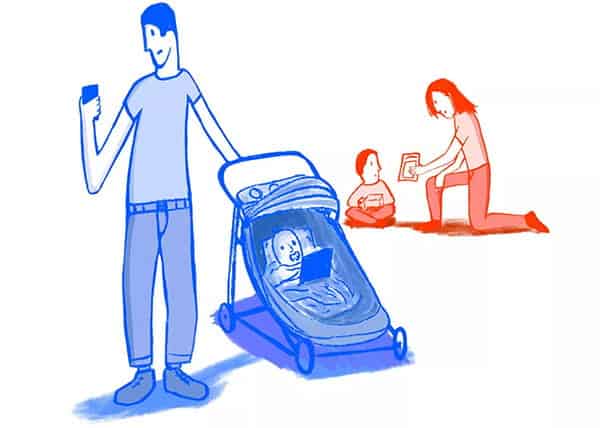
Play with the toddler and let the child tell you how you will play
Playing together has many benefits, from bonding to motor skills development and of course, communication. Let the child lead the play and communicate to you how the game will develop. If the toddler still can’t express wishes with words, you can use narration and interpretation for the child’s nonverbal attempts of communication.
2 years to 3 years old Toddler
Expand their sentences
Toddlers usually have sentences of 2 words by the age of two. To help them expand those, you should repeat their sentences by making them a few words longer. For example, if a toddler says “Give water”, you say “Yes, I will give you water now.” Toddler: “Help”, you say “You want me to help you with that block.”
Give a toddler the time to answer
Grownups are often impatient and provide answers to toddlers before they have enough time to think. If you ask the toddler “What is this animal?”, give plenty of time to think. It can even take a half a minute (yes, it actually seems like an eternity) but as long as you see them concentrating and thinking, don’t interrupt them and don’t offer the answer.
Practice categories
Help them group things in categories. You can say “Stork, Duck, and Crow. They are birds”. “Blocks, cars, and dolls. They are toys.” This will help them later in recalling the information when they need it.
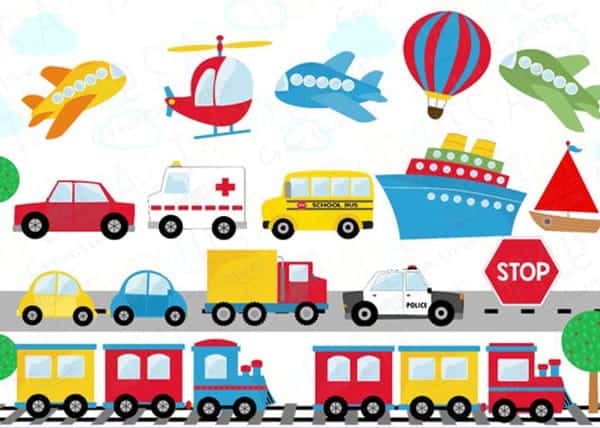
Start using sounds and words with symbolic meaning
Say “Auch!” when you hit yourself, “Whoops!” when you spill something by accident, or “Brrm, brrm” when you see the car.
Turn off background noise like radio or TV
They act as distractors and if you are not intentionally using them, it is much better to turn them off. Background noise makes it harder to listen to you and often interfere with listening.
Talk to toddlers about what you are doing
One of the positive aspects of this age is that toddlers love to help. So when you are doing things, like cleaning or washing laundry, include them and describe what you are doing.
General strategies to encourage talking and language development
The important thing we should always have at the top of or mind is that we should strive to help the children take the steps they are ready for.
We should be realistic and help them reach the next level, not the level that we may be expecting the child should reach. For example, if the child is talking sentences of two words, we should help him reach sentences of 3 words. Not 5! Our goal is to help children feel motivated, engaged, and empowered to continue learning and progressing.
Here we will talk about some strategies you can use across whole child development – from birth to school years. Methods may change through the years but the principles always stay the same.
Don’t force a child to speak
In our eagerness to hear our child speak, we may overdo it and create resentment and stress to the child by insisting it starts to speak. It will come naturally, and you can use other strategies we mention instead of “asking” your child to use words.
Imitate the child and let it imitate you
This shows children they are heard, you approve of what they are doing and saying. Let them imitate you, especially while you are leading them to the next level of speech development.
Interpret what children are doing or saying
The first communication young children use is gestures. Always interpret by words what they are trying to communicate to you.
Expanding and recasting children’s words
When children start to use spoken language, you can always expand their sentences by adding more details. For example, if a child says “Plate”, you can say “Yes, your bamboo plate”. As for grammar, you can use recasting. If a child says “Cat climb tree”, you can say “Yes, the cat is climbing up the tree”. Use a different and slower voice on words you want your child to focus attention on.
Narrating and commenting
While a child is doing things, usually while playing, you can comment and narrate things they are doing. “You are putting animals in the bus”. “You decided to put all stickers in this corner”. This also helps children to organize their thoughts, teaches them new concepts, encourages communication, and greatly improves their language skills.
Respond immediately or as fast as possible
Respond as soon as possible to all child attempts of communication. This will teach them the importance of verbal communication and motivate them to continue learning more advanced communication skills.
Remove “testing” methods
Grownups love this one. But constantly asking children “What is this?”, “What is that?” can be stressful for children and annoy them. It can also lead to unwanted behaviors (tantrums). If you know the child already knows some words, avoid asking them again. Repeating the word will come naturally sooner or later in any case.
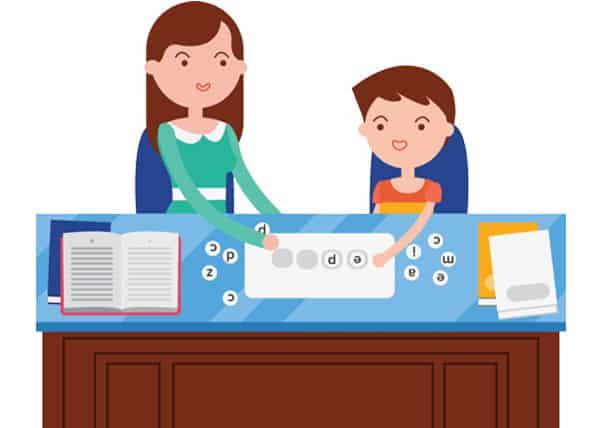
Avoid screens and TV
Avoid screens until the age of 18 months completely! After 18 months, toddlers can have some screen time but limit it to no more than 30 minutes at the start. And when the child starts to watch something, watch with him and talk later about what you were watching. Long periods of screen time is associated with slower language development skills, poorer social skills, and short term memory.
Don’t use negative talk
Avoid correcting the child and saying things like “No, that is not what a cat says”. It is much more effective to use positive talk and say something like “Really? I didn’t know cats say Qua Qua! I only heard them say Meow”. We all respond better to positive talk and we want to encourage children to practice talking, not discourage them.
Wait for the child to ask for help
This can be hard for parents since they are used to taking initiative and solving things even sooner than it is required. If you see the child struggling, for example, with stacking blocks, offer help but don’t intervene. You can say “It seems you need help with building that tower”. Then wait until your child asks you (it can be by gesture if the child is still not speaking) before helping them. This will teach them the importance of communication and how to initiate it when they need something.
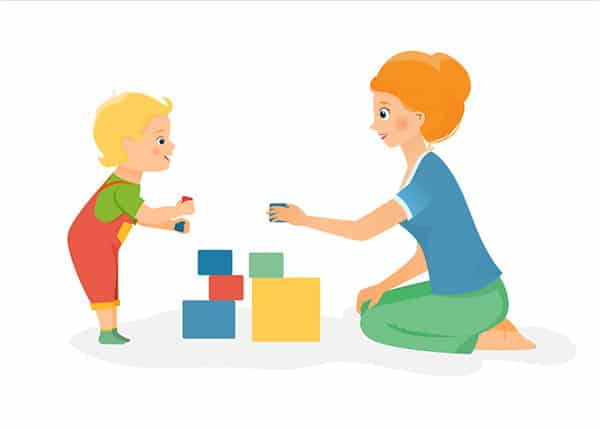
Talk about past and future events
You can look at the pictures you took with your child and talk about those times. This will trigger a memory in the child and it will be strongly motivated to express those memories. Also, you can talk about future plans, like trips and what expects you on the trip. This will create curiosity in the child and it will want to talk about that new, interesting thing that awaits you.
Teach to say “Thank” you and “Please” by making an example
Forcing the child to say words like “thank you” and “please” won’t make them learn the real meaning of those words, and they may start to use those words automatically just because they know you expect them to. A better way is to lead by example and use those words in your household. Children will pick them automatically and start to use when appropriate and more importantly when they actually mean it.
Avoid electronic toys with sounds
It may seem counterintuitive, but toys that produce sounds like talking dolls or electric piano are actually not good for language development. It is more common to TV or screen activities than interactions with other people. These kinds of toys are passive entertainment and there is no effort required to be entertained. It limits the imagination and motivation of a young child while it is passively entertained.
Speech development problems and language delay problems that can cause late-talking in children
Sometimes, whatever we do and no matter what speech development activities we use, the progress will be slow or nonexistent. In those situations, we should check that the reason isn’t one of the speech development disorders. Speech development disorders can develop through life or the child can be born with them.
We mentioned that especially young children, develop on an individual basis so there is no reason for panic if our toddler still didn’t reach some milestone on day 1 when it is expected. But we have some milestones (mentioned at the beginning of an article) that are pretty consistent, and if a child is not meeting them in a month or two, you should consult with your pediatrician.
Also, parents often have good intuition and spot if something isn’t quite right. In the case of child development and possible language delay issues, it is better to believe intuition and seek help than to wait and postpone needed intervention.
Now we will mention some of the most common causes that can slow speech development or make the spoken language totally absent.
Hearing loss
Hearing loss should be the first thing that should be checked and it is often overlooked. You will notice that something could be wrong with hearing if the child shows no reactions to sudden and loud sounds.
Extreme environmental deprivation
If the child is neglected and doesn’t hear other people speaking, there will definitely be signs of speech delay. Children can’t learn to speak if they are not exposed to spoken language.
Autism
Speech and social interaction are aspects that are mostly affected by disorders from the Autism spectrum. Delay of speech and no eye contact are some of the first signs of Autism disorder.
Childhood Apraxia of Speech
Uncommon speech disorder where a child’s brain has difficulty in coordinating oral movements that are needed to transform sounds into syllables, syllables into words, and words into phrases. In short, difficulty in sequencing and executing speech movements. Many speech therapy interventions are quite successful in diminishing the effects of apraxia.
Auditory processing disorder
This disorder is characterized by problems in decoding and interpreting speech sounds.
Selective Mutism
A psychological disorder that is characterized by being unable to talk in certain situations. Most often in front of strangers or groups of people. This requires more psychological intervention than speech therapy.
Neurological disorders
Things like brain injuries, muscular dystrophy, and cerebral palsy can affect muscles that are needed for producing sounds and speech.
If you’re interested in more information and tips about improving child development, you can check out these articles:
- Your Child’s Cognitive Development – to learn about different cognitive milestones children reach through growing up.
- Sensorimotor Activities for Children – interesting activities and suggestions for improvement of sensorimotor skills.
- How to Improve Child’s Working Memory – tips and activities for improvement of short term (working) memory.
- 7 Fun Activities to Learn Letters and Numbers – if you are in the learning letters and numbers stage, check these 7 activities you can use and learn while having great fun.
If you’re searching for some great STEM Activities for Kids and Child development tips, you’re in the right place! Check the Categories below to find the right activity for you.

STEM Science
Videos, guides and explanations about STEM Science in a step-by-step way with materials you probably already have at your home. Find new Science ideas.
Read more
STEM Technology
Videos, guides and explanations about STEM Technology in a step-by-step way with materials you probably already have at your home. Find new Technology ideas.
Read more
STEM Engineering
Videos, guides and explanations about STEM Engineering in a step-by-step way with materials you probably already have at your home. New Engineering ideas!
Read more
STEM Math
Videos, guides and explanations about STEM Math in a step-by-step way with materials you probably already have at your home. Find new Mathematics ideas.
Read more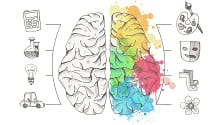
Psychology
Find out all about development psychology topics that you always wanted to know. Here are articles from child psychology and development psychology overall.
Read more
First year of Child’s Life
Following a Child’s development every month from its birth. Personal experiences and tips on how to cope with challenges that you will face in parenting.
Read more